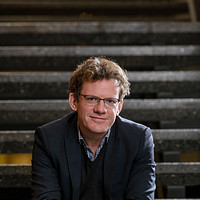Internationalization is a 'strategic line' of Saxion that is bearing fruit. Some ten to fifteen percent of the students come from abroad. But, warns international recruiter Artur Jarosiewicz, 'we' forget those students too quickly once they're onboard. "Internationalization is more than just shouting very loudly that you're international”.
This article is also available in Dutch.
Recently Jarosiewicz e-mailed SaxNow: "It's nice that we have an independent news platform again, but do you also take international students into account by publishing in English, for example? Or even better, by taking into account their perspective, which sometimes clearly deviates from the Dutch?”
Split up
That question is relevant. Internationalization splits minds and is therefore an important journalistic theme. Supporters of internationalization say that the international classroom is a quality impulse for higher education and is necessary for the labor market. And we cannot maintain the quality of higher education in demographic decline without students from abroad. Opponents believe that internationalization is driven by money and the English language displaces Dutch. These topics are the subject of lawsuits and political debates.
Questions
Meanwhile, internationalization has started. SaxNow is diving into this theme in the coming period. We will investigate how things are going at Saxion. How are the international students doing? Are they planning to stay after their studies? What does the board want, what is Saxion doing well and what is lacking in the implementation of internationalization? Is the outside world really interested in international graduates? These are examples of questions we are going to ask. And we would like to hear from you what other subjects we need to investigate. You - our audience - are of course close to the fire and have the expertise in-house. Your input helps us formulate questions and answers.
"Integration works both ways"
In any case, Jarosiewicz sees resistance among Saxion employees against really making good integration work and he sees a lack of mutual commitment. "Especially among colleagues who think they speak English well and regularly go abroad. Integration works both ways: we can expect an effort from incoming students, but certainly also from Saxion. Offering study material in English is not enough".
Own experience
From his own experience Jarosiewicz knows that there are cultural differences, and that you have to make an effort to overcome them. He came to Saxion as a German to study and now works for Saxion from Münster. "When I tell colleagues where I live, they say: what a distance. While Münster - Enschede is not much further away than Enschede - Deventer. In my daily work I also notice differences, in work attitude for example. It's all very understandable, but first you have to be aware that these cultural differences are there".
Understanding each other
Jarosiewicz believes in the benefits of an international organization. "Trump, Brexit - I think this kind of global development can be traced back to a basic element: we don't understand each other very well. For Saxion this is an enormous opportunity; we could serve as an example of an international organization, deeply rooted in the region. But now I see too often that we recruit students and then don't do much together".
Corona crisis
When the corona crisis hit in March, there was too little attention for the international students, according to Jarosiewicz. "Of course, everyone was very busy making the crisis manageable. But we did forget about those international students in the lockdown. They were far from home, in a room of nine square meters. The Buddy Box was actually the only concrete action specifically for international students. And that was an initiative of involved employees, but as an organization we could have done more.”
Internationalization must be done in a Saxion way
Jarosiewicz has no ready-made answers for successful internationalization. "But let's first conclude that there are challenges and that integration takes effort. Many Dutch Saxion students just live at home, go to soccer practice in their home village on Saturdays. In general they are not eager for new contacts, as is often the case in large student cities. This is the starting point. How are we going to facilitate that students do get along and learn from each other? And how do we turn Saxion into a truly international university of applied sciences, which not only says that it attaches value to that, but also acts accordingly?
Gerelateerde artikelen
Column: Lerend vermogen
Ik had voor deze maand eigenlijk een luchtige column geschreven, over grappige lobbyvoorstellen die Saxion zou kunnen doen in aanloop naar de verkiezingen. Dat had een aantal redenen: er is in deze tijd al genoeg om somber over te zijn, bovendien blijken luchtige columns een goede manier om prijzen te winnen.
Anouk Rösken in Opgevallen: “Studenten mogen mij altijd appen, zo van: hey yo, ik loop hier tegenaan”
In deze aflevering van Opgevallen: Anouk Rösken (35), docente aan de opleiding Toegepaste Psychologie. Als voormalig jeugdhulpverlener kwam ze tien jaar lang ‘echt van alles’ tegen, dus schrikt ze niet zo snel van de kwetsbaarheden en problemen van studenten. Integendeel. “Sommige studenten maken echt een diepe indruk op me. Ik leer van hen en zij van mij.”
Saxion wil gebouwen ‘slimmer’ indelen, onderzoekt bezuiniging door afstoten of verhuren ruimtes
Saxion onderzoekt een herindeling van haar gebouwen. Door opleidingen en lectoraten die bij elkaar passen te clusteren ontstaat meer levendigheid én kwaliteit, is de gedachte. Bovendien kunnen de ruimtes dan ‘efficiënter’ gebruikt worden. Om extra geld te besparen wordt gekeken naar het afstoten of verhuren van vierkante meters die nu door Saxion in gebruik zijn.
